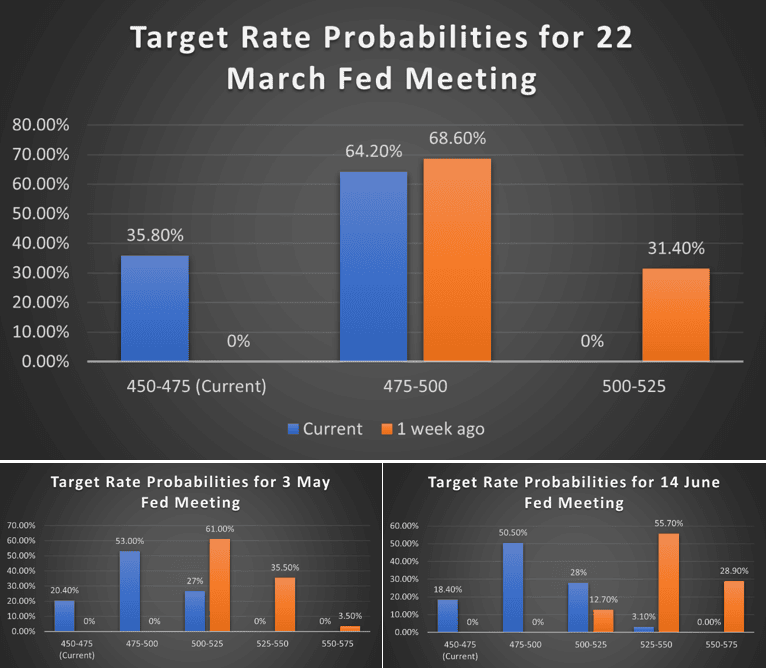Pound and Euro Clobber the Dollar as SVB Failure Heaps Pressure on the Fed to Call Quits on Rate Hikes
- Written by: Gary Howes
- USD under pressure Monday
- Amidst falling U.S. bond yields
- As investors pare expectations for Fed rate hikes
- Financial stability risks grow in wake of recent hikes

Image © Adobe Images
Global short-term bond yields are collapsing as investors bet central banks will have little choice but to ease back on their interest rate hiking intentions in the wake of Silicon Valley Bank's (SVB) collapse.
In currency markets, the Dollar fell sharply amidst the decline in U.S. bond yields, which was faster than elsewhere, Pound Sterling and the Euro meanwhile pushed higher.
SVB sent shockwaves through the global banking sector after it went to the market looking for fresh funding, following losses on its major investment portfolio.
Over the weekend authorities in the U.S. and UK moved to protect SVB depositors, with the UK government facilitating the sale of SVB's UK assets to HSBC.
Ahead of the SVB difficulties, the yield on two-year U.S. government bonds rose to levels not seen since 2007 as markets favoured a 50 basis point rate hike at the Federal Reserve next week. But the subsequent decline was astounding and one would need to go back to 1987 to find such a rapid descent and markets now see a 25bp hike likely in March.
Above: Two-year U.S. bond yields (top) and the Dollar index - a measure of broader USD performance. Consider setting a free FX rate alert here to better time your payment requirements.
The Pound to Dollar exchange rate rallied one percent to 1.2150 on Monday as it extended Friday's rebound. The Euro to Dollar exchange rate was meanwhile a further 0.80% higher at 1.0737.
Dollar losses have extended amidst news Signature Bank in the U.S. is the latest to come under pressure, underscoring a realisation that the rapid rate of interest rates at the Federal Reserve are having an impact on the functioning of the financial system.
"The fact that these banks failed is the result of rapidly rising interest rates and yields, i.e. the Fed’s monetary policy," says Ulrich Leuchtmann, Head of FX and Commodity Research at Commerzbank.
GBP to USD Transfer Savings Calculator
How much are you sending from pounds to dollars?
Your potential USD savings on this GBP transfer:
$1,702
By using specialist providers vs high street banks
Thus far the damage is confined to lenders with exposure to the cryptocurrency and technology sectors, but investors are betting the Fed will be wary of stresses spreading.
"Bond yields and the dollar extended declines in Asia overnight as investors took stock of the collapse of SVB and Signature Bank in the US and subsequent announcement of the Fed and FDIC yesterday to protect depositors and the creation of a new lending facility for banks to prevent contagion to the real economy," says Kenneth Broux, a strategist at Société Générale.
Broux says the market is witnessing the biggest 3-day collapse in two-year U.S. treasury yields since Black Monday in 1987 and this has "logically caused a massive bull steepening" in the differential between two-year and ten-year yields.
"The difficulty to quantify the immediate impact for US financial condition makes a 25bp rate increase by the Fed next week more likely than 50bp," he says.
"The bank failures are unlikely to lead to a financial crisis but the Fed has to pay more attention to financial stability. That means that the terminal rate may be closer than the market inferred after Powell’s testimony last week," says a note from QCAM Currency Asset Management AG.
Shares in another U.S. lender - First Republic Bank - are meanwhile under significant pressure on Monday after it said on Sunday it had secured additional financing through JPMorgan Chase.
First Republic's announcement came after its share price was hit last week in the aftermath of a run on SVB.
"For now, the first order reaction to the financial stability dimension has been dollar-negative via the sharp dovish repricing of the Fed," says Jayati Bharadwaj, an analyst at Barclays.

Above: Expectations for future Fed interest rate moves. Image courtesy of Fawad Razaqzada / City Index.
Credit analysts at Barclays do not think SVB poses a systemic threat to the broader banking system and contagion would therefore be limited.
"However, the market could stay concerned about regional banks amid tightening credit conditions, as these stories are rarely stand-alones. In this context, the dollar-negative bias is likely to stick with us," says Bharadwaj.
Danske Bank's credit research team highlights that distinct features of SVBs business model point to a more idiosyncratic risk event this time around when compared to the crisis of 2008.
"That said, the news will put rising pressure on the US authorities and not least the Fed in fulfilling its dual mandate of price stability and full employment," says Jesper Fjärstedt, Analyst at Danske Bank. "For now the SVB-event skews the balance of risk towards lower rates, a weaker USD."
But analysts at TD Securities are however "wary" that the market "may have overplayed its hand".
Economists at the bank expect Tuesday's U.S. core CPI inflation to come in above expectations at 0.5% month-on-month.
They expect the Fed to take its terminal interest rate to 5.75%, "which should prevent an extension of USD weakness."
GBP to USD Transfer Savings Calculator
How much are you sending from pounds to dollars?
Your potential USD savings on this GBP transfer:
$1,702
By using specialist providers vs high street banks





